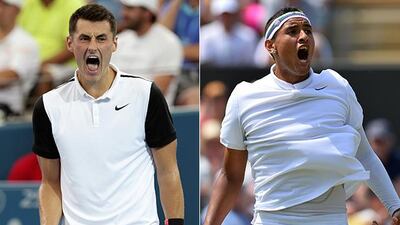There were the usual packed stands around Melbourne Park on Monday as the 103rd staging of the Australian Open began, but while the home fans created plenty of noise, they will have almost certainly kept their expectations in check of home success.
The last Australian male to win the tournament in Melbourne was Mark Edmondson, 40 years ago in 1976, who achieved it in surprising fashion.
He was playing in only his third major and was ranked No 212 in the world at the time, and he is still the lowest-ranked winner of a major since the ATP rankings were introduced in 1973.
Edmondson could never climb higher than No 15 in the rankings, and he never reached another major final.
Also see: The National's Australian Open predictions – Can anyone stop Novak Djokovic?
His career was, perhaps, a sign of things to come in Australian men’s tennis. Or, at least, their prospects at the Australian Open.
Since Edmondson’s win, only three Melbourne men’s finals have featured a home player.
Pat Cash lost in both the 1987 and 1988 finals, while Lleyton Hewitt was beaten in the 2005 tournament decider.
For the tennis fans of a nation that has produced players such as Rod Laver, Ken Rosewall, John Newcombe and Roy Emerson in the past, these must be difficult times then.
In the first 64 years of the tournament, an Australian had won the men’s singles title on 50 occasions, and now the country has not had any for 40 years.
In fact, no home player has won the men’s singles title at any of the four majors since Hewitt’s 2002 Wimbledon triumph, and the last of their 28 Davis Cup titles came in 2003.
Cash, the 1987 Wimbledon winner, concedes Australia has been having a “quiet” time, but then every nation has gone through a similar phase.
“Sometimes, it just comes and goes,” said Cash, explaining how Australia is “a very small country of tennis players” because it is competing with a lot of other sport.
“We love our sport, but most of them are playing Australian Rules football or cricket, or swimming or soccer now,” he said.
“We got a very good women’s netball team and hockey. So there’s lots of sport to play.”
Of course, tennis is also a very different sport today, a truly global game with 11 different nationalities represented in the ATP top 15, including Serbia, Switzerland, Japan, South Africa, Croatia and Canada.
Also, today’s players do not really mind travelling to Australia for the opening grand slam event of the year.
The top players of the past – Jimmy Connors, John McEnroe, Bjorn Borg and Andre Agassi, from the recent decades, readily come to mind – usually avoided that long journey to Australia because it was not considered a “real” major and, between 1977 and 1985, it was held in late December.
Of course, the Australian Open champion enjoys the same prestige as the other three grand slam tournaments now and winning the men’s crown in Melbourne can be one of the toughest tasks, physically at least, due to the high temperatures the event is often played in.
Looking into the future, though, there is hope for Australia, for both Bernard Tomic, the world No 17, and Nick Kyrgios, the No 30, have demonstrated real potential.
Tomic has been talked about as a potential grand slam champion since signing a lucrative representation deal as a 13-year-old with IMG 10 years ago, while Kyrgios has the game to beat any of today’s top stars, with wins against Roger Federer, Rafael Nadal and Andy Murray already to his name.
He started his campaign impressively on Monday’s opening day of the event as he beat Pablo Carreno Busta in straight sets.
The problem, for both, is consistency, their emotions and the demons in their head. They have logged more controversies than titles until now, so a bit of maturing is needed if they hope to reach the next level.
Sure, nobody is demanding instant success. But if these two can go deep into the second week in Melbourne, it can at least give optimism that the good times may not be too far away from returning for
Australia.
arizvi@thenational.ae
Follow us on Twitter @NatSportUAE
Like us on Facebook at facebook.com/TheNationalSport

